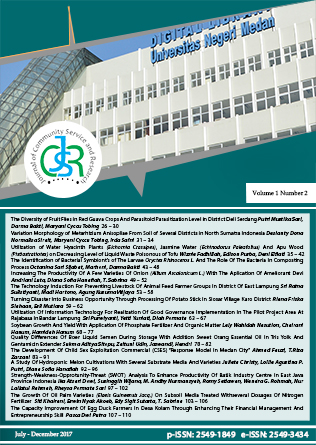MORPHOLOGY VARIATION OF METARHIZIUM ANISOPLIAE FROM SOIL IN NORTH SUMATRA AREAS
DOI:
https://doi.org/10.24114/jcrs.v1i2.9627Abstract
AbstractMetarhizium anisopliae is an important entomopathogenic fungus that mainly used for biological control. Isolates of M. anisopliae extracted from soil from 15 oil palm plantations located in several districts on the Province of North Sumatra, Indonesia have been investigated to identify their morphological diversity. The morphology of assessed fungi was constructed in the the form of conidia, conidia size, color and shape colony and growth diameter of the 15 isolates. All of conidia forms showed cylindrical shape and string together. The length/width (μm) ratio of conidia size was minimum 2,16 and maximum 3,54. The highest growth rate isolates were found in M3 (Bandar Selamat) and M12 (Mancang) treatment and the lowest rate was M11 (Teluk Parit Kaca) treatment. The color of colonies were varied among the isolates. They were greenish yellow, dark green, yellowish and showing zonation/no zonation.Keywords : Metarhizium anisopliae, biological character, morphological diversityDownloads
Published
2018-05-02
Issue
Section
Articles
License
Authors who publish with this journal agree to the following terms:
- Authors retain copyright and grant the journal right of first publication with the work simultaneously licensed under a Creative Commons Attribution License that allows others to share the work with an acknowledgment of the work's authorship and initial publication in this journal.
- Authors are able to enter into separate, additional contractual arrangements for the non-exclusive distribution of the journal's published version of the work (e.g., post it to an institutional repository or publish it in a book), with an acknowledgment of its initial publication in this journal.
- Authors are permitted and encouraged to post their work online (e.g., in institutional repositories or on their website) prior to and during the submission process, as it can lead to productive exchanges, as well as earlier and greater citation of published work (See The Effect of Open Access).
- This work is licensed under a Creative Commons Attribution-ShareAlike 4.0 International License.
This work is licensed under a Creative Commons Attribution-ShareAlike 4.0 International License.


